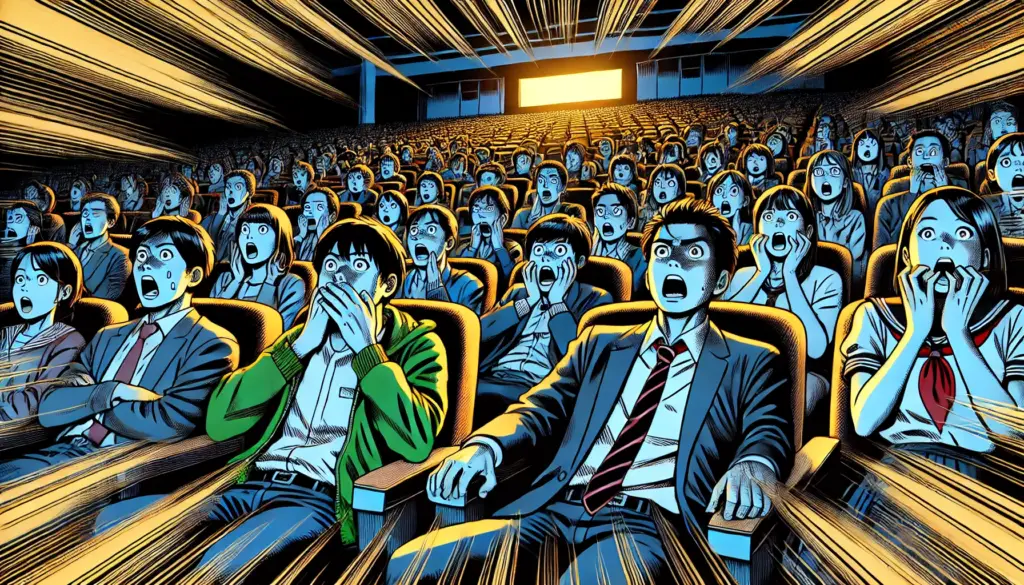
If you’re someone who wants to be disturbed—truly, deeply disturbed—Japanese cinema has just what you’re looking for. Forget jump scares or haunted houses. These movies dig into your soul and shake you from the inside out. Below are some of the most infamous trauma-inducing Japanese films of all time, featuring broken families, psychological torment, and real-life inspired horror. Viewer discretion is absolutely advised.
🔥 1. 鬼畜 (Kichiku) – 1978
Summary: A man is left to care for three illegitimate children after his mistress abandons them. His legal wife, enraged by the betrayal and financial pressure, becomes abusive, and the couple descends into a horrifying spiral of child neglect and violence.
Why it hits hard: The film is frighteningly realistic. There are no monsters—only human cruelty, silence, and complicity. Watching it feels like bearing witness to something you shouldn’t be seeing.
Legacy: Considered a classic of social horror in Japan, Kichiku shocked audiences for portraying child abuse in such an unfiltered, emotionally raw manner.
👅 2. 震える舌 (Furueru Shita / The Trembling Tongue) – 1980
Summary: A young girl contracts tetanus, and the story follows her terrifying physical deterioration. Her parents are forced to watch helplessly as her body convulses and her condition worsens.
Why it hits hard: It’s not just the medical horror that makes this film unforgettable. It’s the psychological breakdown of the parents—the feeling of watching your child suffer and being powerless to stop it.
Legacy: A gut-wrenching depiction of illness and parental fear. Viewers have called it one of the most emotionally devastating Japanese films ever made.
🤱 3. 子宮に沈める (Shikyū ni Shizumeru / Sink Into the Womb)
Summary: Set in a quiet suburb of Osaka, this film follows a mother whose mental health deteriorates while raising two children in isolation. Through long, static shots and no background music, the viewer is dragged into her slow descent into despair.
Why it hits hard: The horror here is subtle, domestic, and painfully real. There’s no gore—just the unbearable weight of loneliness, helplessness, and parental pressure.
Legacy: A modern cult trauma film. It’s often praised for its brave storytelling and uncomfortable honesty about the darker side of motherhood.
🐠 4. 冷たい熱帯魚 (Tsumetai Nettai-gyo / Cold Fish) – 2010
Summary: A timid man who runs a tropical fish store becomes entangled with a charismatic businessman. What starts as a partnership turns into a nightmare of manipulation, murder, and moral collapse.
Why it hits hard: Inspired by true events, this film shows how easily someone can be pulled into horrific acts just by following the wrong person. It’s a study in psychological erosion.
Legacy: A standout film by director Sion Sono, Cold Fish is now a benchmark in Japanese trauma cinema. It combines domestic life with extreme violence in a way that feels dangerously real.
😈 5. 凶悪 (Kyōaku / The Devil’s Path) – 2013
Summary: A journalist investigates a series of confessions from a death-row inmate, revealing the terrifying crimes of a manipulative accomplice still at large. As the story unfolds, lines between good and evil blur.
Why it hits hard: It’s not just the physical violence that’s terrifying—it’s the emotional detachment of the perpetrators and the disturbing sense that the system can’t always protect the innocent.
Legacy: A critical and commercial success, Kyōaku remains a haunting commentary on justice, morality, and the nature of evil.
💀 Other Notorious Japanese Trauma Films
- グロテスク (Grotesque) – Pure torture horror. A man kidnaps a couple and subjects them to unimaginable physical abuse. Too extreme for many.
- ノロイ (Noroi) – A slow-burn found-footage horror that ends in pure psychological terror.
- ミスミソウ (Liverleaf) – A schoolgirl is brutally bullied and takes revenge in one of the most shocking films of the 2010s.
- Naked Blood – Experimental horror involving self-mutilation and a bizarre love story.
🧠 Why Do We Watch These?
- To confront reality: These films reflect social taboos—abuse, neglect, mental illness—that many would rather ignore.
- To feel something raw: Unlike Hollywood-style thrillers, these movies don’t offer closure. They offer discomfort. And sometimes, that’s exactly what we seek.
- To understand ourselves: When you watch something truly disturbing, you also discover what you value, fear, and believe.
⚠️ Watch With Caution
These aren’t your average horror films. They’re emotionally heavy, sometimes triggering, and often hard to forget. If you choose to explore them:
- Take breaks between viewings.
- Reflect on your feelings afterward.
- Talk to someone if you feel emotionally affected.
- Don’t binge them all at once—trust me.
Final Thoughts
Japanese trauma films don’t just entertain—they disturb, question, and challenge. They’re not for everyone, but for those who dare, they offer a cinematic experience like no other. Just remember: once you’ve seen them, you can’t unsee them.



















































